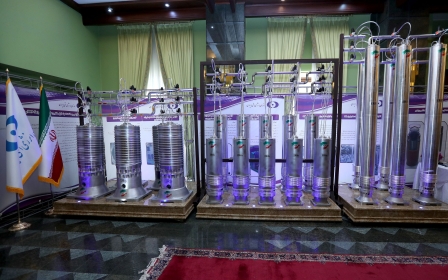Iran 'always welcomed' dialogue with Saudi Arabia, foreign ministry says

Iran's foreign ministry said the Islamic Republic remains open to dialogue with Saudi Arabia, as reports of direct talks between the two countries surface.
Foreign Ministry spokesman Saeed Khatibzadeh, during a news briefing on Monday, said that Iran-Saudi ties are important for the two countries as well as the region as a whole, indicating the possibility of reconciliation after years of tensions.
Stay informed with MEE's newsletters
Sign up to get the latest alerts, insights and analysis, starting with Turkey Unpacked
On Sunday, the Financial Times first reported that Saudi and Iranian officials met in Baghdad in recent weeks in an attempt to mend their long-contentious relationship between the two neighbouring powers.
Saudi Arabia has denied that direct talks have taken place, but Khatibzadeh referenced the reports on Monday without confirming or denying the news.
"We have seen media reports about talks between Iran and Saudi Arabia, although the reports sometimes had contradictory quotes," Khatibzadeh said.
"What is important is that the Islamic Republic of Iran has always welcomed dialogue with the Kingdom of Saudi Arabia and considers it in the interest of the people of the two countries, as well as peace and stability in the region," he said.
Changing tides
Diplomatic relations between Iran and Saudi Arabia were severed in January 2016 after the Saudi embassy in Tehran was attacked by protesters following the execution of prominent Saudi Shia cleric Sheikh Nimr al-Nimr.
The possibility of reconciliation comes as the US works to re-enter nuclear discussions with Iran and end the proxy war in Yemen which has seen Iranian and Saudi interests pitted against one another.
Saudi Arabia stepped into the war in Yemen near its start six years ago, aligning with the internationally recognised government, while Iran has backed Houthi rebels, the main opposition group.
Meanwhile, Saudi Arabia has been opposed to world powers seeking to preserve the multilateral nuclear deal with Iran, as it wants the international community to take a harder stance against Tehran's missile programme and regional behaviour.
Saudi Crown Prince Mohammed bin Salman (MBS) won favour with former US President Donald Trump, who had instituted a "maximum pressure" campaign against Iran involving the imposition of harsh sanctions - a policy Riyadh very much supported.
But as US President Joe Biden vows to re-enter negotiations with Iran and take a harder stance against Saudi Arabia's human rights abuses, regional tides may be shifting.
Reports on Sunday said Iraqi Prime Minister Mustafa al-Kadhimi, who has US support, has been a key player in the alleged peace talks.
Kadhimi met with MBS in Riyadh last month, according to the Financial Times. Meanwhile, the Iraqi Prime Minister has also been facilitating talks for Iran with Egypt and Jordan, the newspaper reported.
Middle East Eye delivers independent and unrivalled coverage and analysis of the Middle East, North Africa and beyond. To learn more about republishing this content and the associated fees, please fill out this form. More about MEE can be found here.






